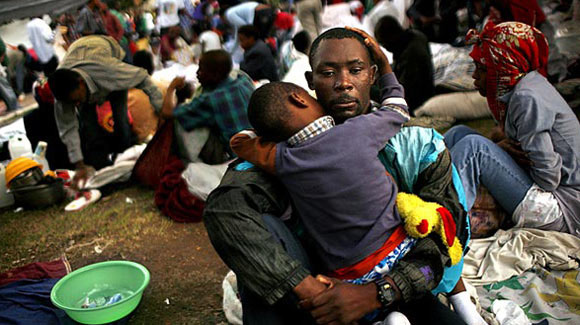
|  |  |  Americas & Beyond Americas & Beyond  
U.S. to Change Illegal Haitian Immigrants' Status
 Richard Fausset - Los Angeles Times Richard Fausset - Los Angeles Times
go to original
January 16, 2010


| | A man holds his sleeping son during another night in a park in Port-au-Prince. Homeland Security Secretary Janet Napolitano said Haitians living in the island nation would not be eligible for temporary protected status. (Carolyn Cole/Los Angeles Times) |  |
The temporary measure is aimed at increasing remittances to the devastated nation. Officials emphasize that Haitians not in the U.S. are ineligible and will be repatriated if they try to migrate.

Miami - In an attempt to ensure the flow of remittances to devastated Haiti, Homeland Security Secretary Janet Napolitano announced Friday that the Obama administration would temporarily grant legal status to the tens of thousands of Haitian immigrants who were living in the United States illegally before this week's earthquake.

But Napolitano emphasized that Haitians living in the island nation would not be eligible for temporary protected status, and would be repatriated if they attempted to enter the country, an implicit acknowledgment of the fear, thus far unrealized, that the earthquake could trigger a mass migration of Haitians to U.S. shores.

"At this moment of tragedy in Haiti it is tempting for people suffering in the aftermath of the earthquake to seek refuge elsewhere," Napolitano said in a conference call with reporters. "But attempting to leave Haiti now will only bring more hardship to the Haitian people and nation."

The announcement of the status change came as Miami officials refined their contingency plans to accommodate thousands of Haitian refugees.

Dan Stein, president of the Federation for American Immigration Reform, warned that Napolitano's new rule, despite its back-dating, would be interpreted by residents of the troubled island nation as an invitation to sail north.

"The rumors are going to fly," Stein said. "What she's doing is dangerous, irresponsible and fraught with peril."

Temporary protected status is granted on occasion to foreign nationals whose home countries are experiencing an armed conflict or natural disaster. In this case, Napolitano said, the special status will last 18 months, and allow undocumented Haitians to get work permits and send much-needed dollars back home.

The United States, Napolitano said, may be home to as many as 200,000 illegal Haitian immigrants.

This week, the administration suspended deportations to Haiti, on the grounds that the country is too wrecked to accommodate repatriated citizens.

Since the earthquake, the demand for the protected status had been taken up by a swelling chorus of advocates, including Haitian American activists, immigrant rights groups and conservative Cuban American lawmakers in Florida, such as Republican U.S. Rep. Lincoln Diaz-Balart.

Many of those pushing for the change of status had been doing so since 2008, when four storms killed nearly 800 Haitians and caused $1 billion in damage.

"I'm elated. It's been a long struggle. A long fight," said Marleine Bastien, executive director of the group Haitian Women of Miami, who had issued a passionate plea to President Obama this week. "I think it will play a major role in assisting and encouraging Haitians to stay and participate in the rebuilding of Haiti. Haitians are very hardworking individuals. We will keep these remittances flowing."

If Haitians do travel to Florida en masse, officials here say they are ready. They are already familiar with the realities of mass migration.

Memories linger here of the 1980 Mariel boatlift, in which more than 100,000 Cubans arrived in Florida after fleeing the Castro regime. Much of the preparation since then has been in anticipation of refugees who might flee Cuba after the death of Fidel Castro or some similar disruption.

In Miami-Dade County this week, officials held numerous meetings to tweak what is officially called the "Change in Caribbean Government Plan" to provide medical aid, screening and temporary housing to large numbers of Haitians.

The county school district has worked up a plan that would include opening three large refugee acceptance centers and converting a district-owned hospital building to a live-in center for as many as 500 refugee children. Separately, the Archdiocese of Miami has proposed establishing a program to bring large numbers of Haitian orphans to the area.

Alberto Carvalho, the county schools superintendent, said the district's plans would be contingent upon millions of dollars in federal reimbursements that have yet to be promised.

"The willingness of the people of Miami to accept those in need is evident," he said. "The cost, however, is a worry."

richard.fausset(at)latimes.com
|

 |
|  |



